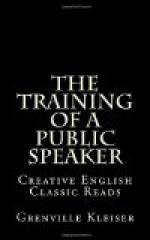Granting all this as sound argument, we must draw this necessary inference, that neither generals of armies, nor magistrates, nor medicine, nor philosophy, will be of any use. Flaminius, an imprudent general, lost one of our armies. The Gracchi Saturninus, and Glaucia, to raise themselves to dignity, put Rome into an uproar. Physicians often administer poisons, and among philosophers some have been found guilty of the most enormous crimes. Let us not eat of the meats with which our tables are spread, for meats frequently have caused disease. Let us never go into houses; they may fall and crush us to death. Let not our soldiers be armed with swords; a robber may use the same weapon against us. In short, who does not know that the most necessary things in life, as air, fire, water, nay, even the celestial bodies, are sometimes very injurious to our well-being?
But how many examples can be quoted in our favor? Did not Appius the Blind, by the force of his eloquence dissuade the Senate from making a shameful peace with Pyrrhus? Did not Cicero’s divine eloquence appear more popular than the Agrarian law he attacked? Did it not disconcert the audacious measures of Cataline? And did not he, even in his civil capacity, obtain by it honors that are conferred on only the most illustrious conquerors? Is it not the orator who strengthens the soldier’s drooping courage, who animates him amidst the greatest dangers, and inspires him to choose a glorious death rather than a life of infamy?
The example of the Romans, among whom eloquence always has been held in the greatest veneration, shall have a higher place in my regard than that of the Spartans and Athenians. It is not to be supposed that the founders of cities could have made a united people of a vagabond multitude without the charms of persuasive words, nor that law-givers, without extraordinary talent for speaking, could have forced men to bend their necks to the yoke of the laws. Even the precepts of moral life, tho engraved on our hearts by the finger of nature, are more efficacious to inspire our hearts with love for them when their beauty is displayed by the ornaments of eloquent speech. Tho the arms of eloquence may harm and benefit equally, we must not, therefore, look on that as bad which may be put to a good use. Doubts of this kind may well be entertained by such as make “the force persuasion the end of eloquence,” but we who constitute it “The science of speaking well,” resolved to acknowledge none but the good man an orator, must naturally judge that its advantage is very considerable.




